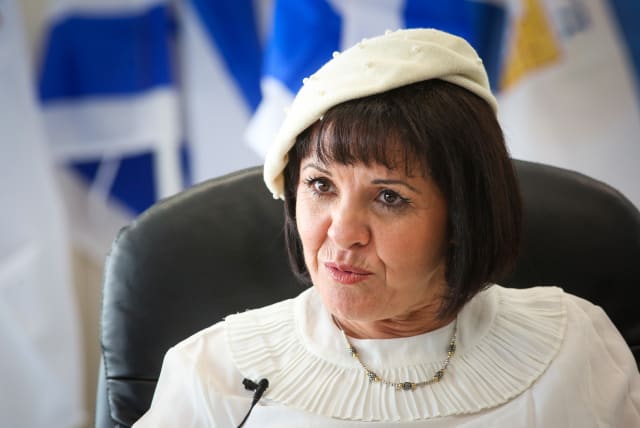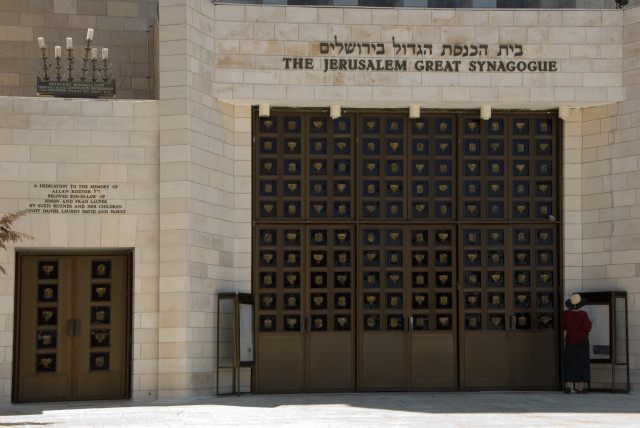Grapevine April 28, 2024: Israel Prize disputes

Movers and shakers in Israeli society.
CONTROVERSY OVER the awarding of the Israel Prize has not yet subsided. Attorney Batya Kahana Dror recently filed an urgent petition to the High Court of Justice seeking to prevent Sephardi Chief Rabbi Yitzhak Yosef from receiving the Israel Prize for Torah Literature, which was announced in March. Kahana Dror’s complaint has nothing to do with Torah literature, but with Yosef’s remarks on the haredi draft, which have been interpreted as encouraging draft-dodging by ultra-Orthodox young men considered eligible for army service. The Movement for Quality Government filed a similar complaint in March, calling for the rabbi’s removal from the Great Rabbinical Court of Appeals in a letter to Uri Shoham, the Israeli judiciary’s ombudsman.
The letter accused Yosef of overstepping his role by supporting the attempt to prevent the enactment of legislation that would force ultra-Orthodox youth to perform military service. Yosef was reported to have said that if there is a change from the status quo whereby exemption from military service will no longer be valid, ultra-Orthodox youth will leave the country in droves. As a public servant who receives his salary from the state, Yosef spoke out of turn, and what he said was a form of incitement. He has since stated that he was misunderstood, but to no avail. There have been calls for his ouster and for the retraction of the award. There have also been demonstrations against him.
As has happened in the past, the question arises as to whether a person should be judged only for achievements in the category in which he or she has been named as an Israel Prize winner or whether the awarding of the prize should also be based on that person’s behavior and political and religious views and affiliations.
Empty seats on Passover at the Great Synagogue
■ ONE OF the most demoralizing things that could happen during a pilgrim festival, such as Passover, is to attend services at the majestic Jerusalem Great Synagogue and see that most of the seats are empty.
There could be several reasons for this.
One is that people slept in after the Seder, having gone to bed at midnight or later. Another is that, due to numerous flight cancellations, many of the thousands of evacuees transferred to Jerusalem after October 7 have returned to their homes, leaving no tourists to replace them. Yet another is the police warning following the terrorist attack in Jerusalem just ahead of the holiday; fear may have kept some people at home.
But, as always, the inspiring Great Synagogue choir, with its wide vocal range that accompanied Cantor Tzvi Weiss and was conducted by Elli Jaffe, was top-notch, even though it’s somewhat disconcerting that Weiss sings in the Ashkenazi pronunciation of Hebrew. Latecomers began to file in after the Bible reading, more so in the men’s section than in the women’s, but there were still far too many empty seats in both.
In nearby France Square, a long, symbolic Seder table had been set with artistically folded yellow paper napkins on each plate, empty wine bottles, and dead flowers. Each chair had a large photograph of a hostage, affixed with his or her name, sending a powerful message. The symbolic high chair at the head of the table, which bore the portrait of Kfir Bibas, the youngest of the hostages, was especially poignant. The fact that the high chair was at the head of the table was reminiscent of the prophet Isaiah’s vision, which, in addition to including the wolf dwelling with the lamb and the leopard with the young goat and the lion, spoke of a small child who would lead them.
Though each and every hostage is equally important, none has captured as much sympathy as Kfir Bibas, whose first birthday on January 18 was spent in captivity in Gaza.
The venue for the symbolic Seder was appropriate in that there are synagogues within the distance of a kilometer in all directions, representing most streams of Judaism. Prayers and special psalms for the hostages have been incorporated into synagogue services.
Hamas's hostage video
■ THE VIDEO of Hersh Goldberg-Polin that was released by Hamas last week and the timing of the release may possibly be attributed to two factors. One is that he is a dual national, holding American and Israeli citizenship, and the other is that his mother, Rachel Goldberg-Polin, was included in Time Magazine’s list of the 100 most influential people. Goldberg-Polin has been extremely active in the campaign by hostage families for the return of their loved ones to Israel.
Unfortunately, because the date of the video is unknown, no one knows the true state of Hersh’s health. But what matters is that, hopefully, he’s alive, and unlike so many other parents who have no idea whether their sons and daughters are alive, the Goldberg-Polins have at least received a sign, and they can play the video over and over again. It is so terribly important for hostage families to keep getting the word out, not just because they want more people to understand what has happened and to imagine what it would be like if one of their loved ones were captured by Hamas, but because Gilad Shalit had been heartened during his captivity by hearing on the radio that his family and the Israel government had not given up on him. His captors had allowed him to listen to the radio from time to time, which is why the messages of relatives of the hostages are rebroadcast several times a day, and the message always includes all the hostages, assuring them that the efforts for their release are ongoing without let-up.
Meanwhile, news of the release of the video, which was the first sign of life that Hersh Goldberg Polin’s family have received since October 7, prompted a spontaneous demonstration near the prime minister’s residence in Jerusalem with a demand to resume negotiations for the return of the hostages. The number of demonstrators quickly swelled into the hundreds, necessitating police intervention. Police pushed the crowd back into France Square, where the noise level was much louder than at demonstrations last year.
Tribute to the Dayan family
■ THE FINAL resting place of members of the famed Dayan family, whose contributions to the nation have been military, political, literary, and dramatic, includes Assi Dayan, the celebrated actor and filmmaker, who died on May 1, 2014, and his cousin Yehonatan Geffen, the author, poet, songwriter, journalist, satirist, and playwright who died on April 19, 2023.
Because Nahalal was home to so many well-known personalities, the cemetery, like the Trumpeldor Cemetery in Tel Aviv, is embedded in the nature of a tourist site, where the names on the tombstones are linked to the evolving history of the state.
Writing in Maariv, the sister publication of The Jerusalem Post, journalist Lior Dayan, in paying tribute to his father Assi, who unfortunately was a drug addict, observes that so often, when a parent dies, his or her children say they regret that there are so many things they never got around to telling them. But that was not the case with him and his father, Lior wrote. They told each other everything, candidly and without secrets. At the start of the lengthy article, he mentions how the tour guide’s anecdotes about the Dayan family captivate the tourist groups that visit the cemetery. On a recent visit to his father’s grave, he overheard a boy, standing with his mother, asking in relation to Assi, “So, what did he do?”
“He did a lot,” she replied.
“A lot of good or a lot of bad?” he persisted.
“A lot of good for the public; a lot of bad for himself,” she answered.
In Lior’s opinion, this was the most succinct and definitive summing up of who his father was.
Aliza Bloch's new book
■ POLITICAL LEADERS who lose to their opponents quickly learn that there is life beyond the corridors of power. Aliza Bloch, the immediate past mayor of Beit Shemesh, despite an intensely busy schedule during her period in office, nonetheless found time to prepare her new book, Bridges of Light, which she launched this month in the presence of Minister without Portfolio Chili Troper and several past and present politicians, including members of the Beit Shemesh Municipal Council, as well as other well-known figures.
ANZAC Day in Israel
■ ANZAC DAY, which commemorates the ill-fated dawn landing in Gallipoli by Australian and New Zealand troops on April 25, 1915, has for many years been a day of remembrance for all the Australian and New Zealand soldiers who died in the line of duty. In Israel, the ANZAC Day service is traditionally held at the Commonwealth War Graves Cemetery in Jerusalem at a reasonable hour of the morning, though one of the recent Australian ambassadors insisted on a dawn service. It is usually hosted by the Australian ambassador and attended by military attachés – and, occasionally, by ambassadors of the Allied Forces that fought in the First World War – as well as by representatives of the Turkish and German embassies. This year, due to the current security situation and the Passover holiday, the service was shorter than in past years, and instead of being held in Jerusalem, it took place at the Ramleh War Cemetery on Thursday of last week at the reasonable hour of 9.30 a.m. Kudos to Australian Ambassador Ralph King for refraining from a dawn service.
greerfc@gmail.com
Jerusalem Post Store
`; document.getElementById("linkPremium").innerHTML = cont; var divWithLink = document.getElementById("premium-link"); if (divWithLink !== null && divWithLink !== 'undefined') { divWithLink.style.border = "solid 1px #cb0f3e"; divWithLink.style.textAlign = "center"; divWithLink.style.marginBottom = "15px"; divWithLink.style.marginTop = "15px"; divWithLink.style.width = "100%"; divWithLink.style.backgroundColor = "#122952"; divWithLink.style.color = "#ffffff"; divWithLink.style.lineHeight = "1.5"; } } (function (v, i) { });

